中职英语基础模块上册Unittime
中职英语基础模块上册unit1

a kiss on the cheek
接吻礼:接吻礼是西欧流行在亲人、朋友、夫妻之间的 亲昵礼节,一般只能在受礼者脸颊上轻吻一下,不能发出声 音。感情激烈时,比如说遇到喜事或丧事,也可以使用接吻 礼,表示兴奋或者安慰、同情。
bisous 贴面礼: 在阿拉伯国家,两个老朋友相见 不仅仅会握手和拥抱, 还会行贴面礼。行礼时,用右手 扶着对方的左肩,左手搂住对方 的腰, 左——右——左贴面三次。如果 两人关系亲密,还会在贴面的同 时发出亲吻的声音。
Unit1、Greetings Unit2、Family
Lorem ipsum dolor sit amet,
consectetur adipisicing elit, sed do eiusmod tempor incididunt ut labore et
Unit7、Computers Unit8、Brave It Out Unit9、Cultivation Unit10、Sports
13. l_______(图书馆) 14. l______ (批,块) 15. r________ (读,阅读) 16. s_____ (学习) 17. a__________ (在...之后) 18.s________(看见) 19. n__________ (下次的,其次的) 20. d____________ (宿舍) 21. d__________ (餐厅) 22. b__________ (卧室,寝室)
Warm-up
Look at the picture and tick. Emily and Jenny meet each other for the first time. Tick what they would say.
《Time》中职英语(基础模块 上册)Unit 4ppt课件4【语文版】

It’s time to say
goodbye.
编者语
• 要如何做到上课认真听讲?
•
我们都知道一个人的注意力集中时间是有限的,一节课45分钟如何保持时时刻刻都能认真听讲不走神呢?
•
1、往前坐
•
坐的位置越靠后,注意力就越难集中。老师不会注意到你的事实可以让你不再紧张,放心去做别的事情。坐在后面,视线分散,哪怕你是在看老师,如果有人移动,你的视线就会飘到那个同学的后脑勺上去,也就无法集中注意力。 而且,坐在后面很
Unit 4 Time
CC
1. Read out the numbers
Magic eyes
What can you see? I can see …
two staplers
nine apples
six pencils
也可以画一个圆,逐个标12个点。It’s a clock.我们用来看时 间。
Carefully-reading:
Paragraph1:
How did the boy feel when he heard his grandpa would come? why?
One day, my father said to me, 一天 我的爸爸 告诉 我
这个句子是现在进行时 态吗?yes/no
I know you are busy with your work and study.
我知道你学习和工作很忙,
“忙于干某事儿”还可以如何表达?
So I took a taxi to come here from the airport.”
所以我乘出租车从机场来家了。”
I was too ashamed to say a word.
语文版中职英语基础模块1 Unit1重点语言知识汇总
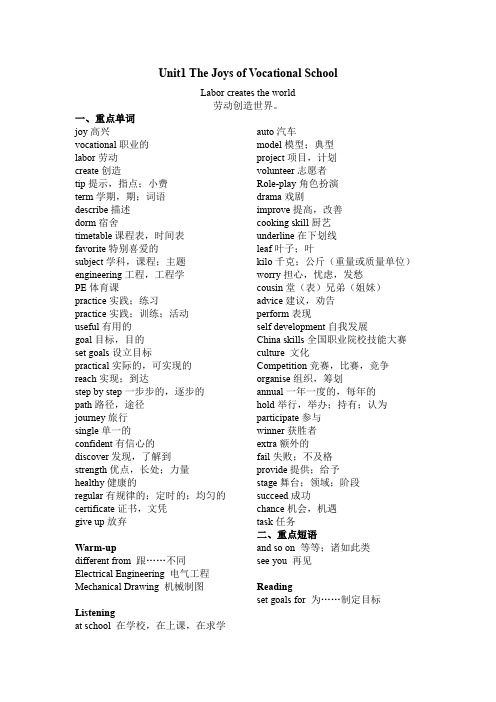
Unit1 The Joys of Vocational SchoolLabor creates the world劳动创造世界。
一、重点单词joy高兴vocational职业的labor劳动create创造tip提示,指点;小费term学期,期;词语describe描述dorm宿舍timetable课程表,时间表favorite特别喜爱的subject学科,课程;主题engineering工程,工程学PE体育课practice实践;练习practice实践;训练;活动useful有用的goal目标,目的set goals设立目标practical实际的,可实现的reach实现;到达step by step一步步的,逐步的path路径,途径journey旅行single单一的confident有信心的discover发现,了解到strength优点,长处;力量healthy健康的regular有规律的;定时的;均匀的certificate证书,文凭give up放弃auto汽车model模型;典型project项目,计划volunteer志愿者Role-play角色扮演drama戏剧improve提高,改善cooking skill厨艺underline在下划线leaf叶子;叶kilo千克;公斤(重量或质量单位)worry担心,忧虑,发愁cousin堂(表)兄弟(姐妹)advice建议,劝告perform表现self development自我发展China skills全国职业院校技能大赛culture 文化Competition竞赛,比赛,竞争organise组织,筹划annual一年一度的,每年的hold举行,举办;持有;认为participate参与winner获胜者extra额外的fail失败;不及格provide提供;给予stage舞台;领域;阶段succeed成功chance机会,机遇task任务二、重点短语Warm-updifferent from 跟……不同Electrical Engineering 电气工程Mechanical Drawing 机械制图Listeningat school 在学校,在上课,在求学and so on 等等;诸如此类see you 再见Readingset goals for 为……制定目标work hard 努力工作(学习)reach one’s goals 达到目标step by step 一步步地begin with 以…开始,从…开始have a bright future 前途光明keep improving 精益求精live a healthy life过健康的生活do regular exercise 定期锻炼get an IT certificate 获取IT证书give up 放弃;投降Speakingmake models 制作模型join a painting club 加入绘画俱乐部play football with friends 和朋友一起踢足球repair autos 修理汽车work on 从事于…;致力于in the playground 在运动场上talk with 与…交谈see you tomorrow 明天见would like to 愿意,意欲after school 放学后make new friends 结交新朋友improve cooking skills 提高烹饪技能Culture cornerbuild one’s dream 造梦National V ocational Students Skills Competition全国职业专业学生技能竞赛the Ministry of Education 教育部China’s vocational education中国职业教育more than 超过the Modern Logistics Integrated Operation现代物流一体化经营give up 放弃;投降provide... for... 提供....have a strong desire to succeed有强烈的成功的愿望in one way or another不管怎样三、重点句子Listening1.—How is your first day at school?—It’s wonderful.2.—What subjects do you have this term?—I have Maths, IT, PE and so on. 3.—What about you?—I have Engineering,Computer and Maths too.4.—Which is your favorite subject?—I like IT best.5.It is time for class.1.—你上学的第一天过得怎么样?—太棒了。
中职英语基础模块上Unit4-Time说课稿
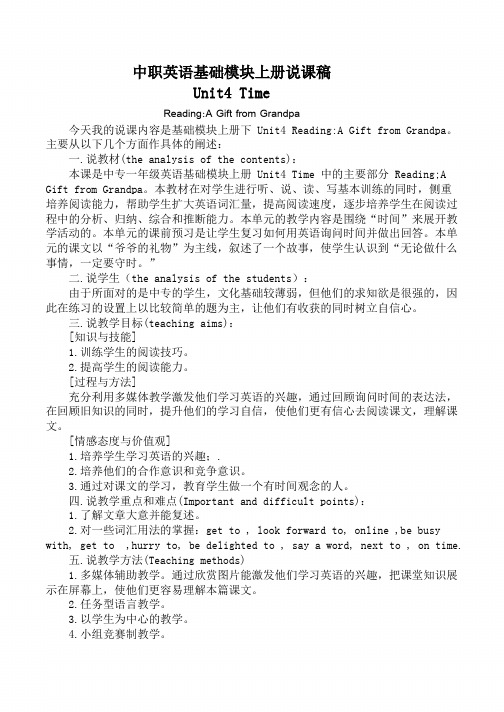
中职英语基础模块上册说课稿Unit4 TimeReading:A Gift from Grandpa今天我的说课内容是基础模块上册下 Unit4 Reading:A Gift from Grandpa。
主要从以下几个方面作具体的阐述:一.说教材(the analysis of the contents):本课是中专一年级英语基础模块上册 Unit4 Time 中的主要部分 Reading;AGift from Grandpa。
本教材在对学生进行听、说、读、写基本训练的同时,侧重培养阅读能力,帮助学生扩大英语词汇量,提高阅读速度,逐步培养学生在阅读过程中的分析、归纳、综合和推断能力。
本单元的教学内容是围绕“时间”来展开教学活动的。
本单元的课前预习是让学生复习如何用英语询问时间并做出回答。
本单元的课文以“爷爷的礼物”为主线,叙述了一个故事,使学生认识到“无论做什么事情,一定要守时。
”二.说学生(the analysis of the students):由于所面对的是中专的学生,文化基础较薄弱,但他们的求知欲是很强的,因此在练习的设置上以比较简单的题为主,让他们有收获的同时树立自信心。
三.说教学目标(teaching aims):[知识与技能]1.训练学生的阅读技巧。
2.提高学生的阅读能力。
[过程与方法]充分利用多媒体教学激发他们学习英语的兴趣,通过回顾询问时间的表达法,在回顾旧知识的同时,提升他们的学习自信,使他们更有信心去阅读课文,理解课文。
[情感态度与价值观]1.培养学生学习英语的兴趣;.2.培养他们的合作意识和竞争意识。
3.通过对课文的学习,教育学生做一个有时间观念的人。
四.说教学重点和难点(Important and difficult points):1.了解文章大意并能复述。
2.对一些词汇用法的掌握:get to , look forward to, online ,be busy with, get to ,hurry to, be delighted to , say a word, next to , on time.五.说教学方法(Teaching methods)1.多媒体辅助教学。
中职英语基础模块上册

13. l_______(图书馆) 14. l______ (批,块) 15. r________ (读,阅读) 16. s_____ (学习) 17. a__________ (在...之后) 18.s________(看见) 19. n__________ (下次的,其次的) 20. d____________ (宿舍) 21. d__________ (餐厅) 22. b__________ (卧室,寝室)
❖ v./n. 参观 ❖ n.时间;次数 ❖ adj.英国的,英语的/n.英语 ❖ v.想要 ❖ n.书桌;办公桌 ❖ n.椅子
Hello ! 你好
Good morning!早上好 Good morning!早上好
常
常
见
见
问
问
候
候
语
语
Hello,What ’s your name?你叫什么名字?
Hi,my name is源自地你好,我叫 色how are you? 你好吗?
Fine, thanks ,and you? 我很好,谢谢
Unit1、Greetings
Unit2、Family
Unit3、Campus Lorem ipsum dolor sit amet, Life
consectetur adipisicing elit,
Unit4、Time sed do eiusmod tempor
incididunt ut labore et
eg. read a book
❖study
❖ v.学习
❖after
❖ 在…之后
after class 课后
例篮句球:。许多学生在课后打baesgk.etMbaanlyl
中职英语基础模块第一册unit

中职英语基础模块第一册 UnitUnit概览•本单元的主题是介绍个人信息和日常生活。
•学习目标:学习英语中有关个人信息、日程安排、购物以及问路的常用表达方式。
•主要词汇:个人信息、时间、购物、问路等。
1. 个人信息(Introduction)1.1 自我介绍(Self-Introduction)在日常交流中,我们经常需要进行自我介绍。
以下是一些常用的句子:•Hi, my name is [your name]. 你好,我叫[你的名字]。
•Nice to meet you. 很高兴认识你。
•I am [your age] years old. 我今年[你的年龄]岁。
•I come from [your country]. 我来自[你的国家]。
•I am a student/worker. 我是一名学生/工作者。
•My hobbies are [your hobbies]. 我的爱好是[你的爱好]。
•I can speak [languages you speak]. 我会说[你会说的语言]。
1.2 个人信息(Personal Information)在日常生活中,我们会被问到一些个人信息。
以下是一些相关表达方式:•What is your full name? 你的全名是什么?•When is your birthday? 你的生日是什么时候?•Where are you from? 你来自哪里?•What is your phone number? 你的电话号码是多少?•What is your email address? 你的邮箱地址是什么?2. 日程安排(Scheduling)2.1 询问时间(Asking for Time)在日常生活中,我们经常需要询问时间。
以下是一些常用的句子:•What time is it? 现在几点了?•Do you have the time? 请问你能告诉我时间吗?•Could you tell me the time, please? 请问你可以告诉我时间吗?2.2 时间表达(Time Expressions)在安排时间时,我们需要使用一些时间表达方式。
中职英语基础模块time

Unit 4
1
A Gift From 1. Warming up Grandpa
2
2. Lead in
3 3. Reading & Sharing What 4 are you going to say ? 4. Summary 5 Eg: The time table tell us
5. Homework when the plane will arrive.
I know you are busy with your work and study. 我知道你学习和工作很忙, “忙于干某事儿”还可以如 何表达? So I took a taxi to come here from the airport.” Unit 4 所以我乘出租车从机场来家了。” I was too ashamed to say a word. Too…to 我太惭愧了,一句话也说不出来。 …太…而 不能... My father looked very angry. 我爸爸看起来很生气。
4. Summary
4 无论什么 …… on PARAGRAPH How time terrible it 4 is! 5. Homework 羞愧的做不了某事……按时,准 太糟糕了。Grammar
Unit 4
数 词
Listening & speaking
Unit 4
Read the number given below as a station attendant.
But it tells me more than that.
No matter what to do, just do it on time.
3. Sharing
中职英语基础模块上册unit1单词表
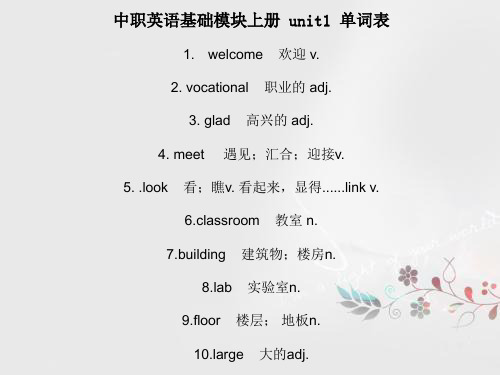
19. ne舍n.
21.dinning-hall 餐厅n. 22.welcome to ... 欢迎到......来 23. be glad to do... 很高兴做......
24. look at... 看...... 25.classroom building 教学楼
10.hard 努力地adv. 硬的;难的 adj.
11.thank 感谢v. &n. 12.thank... for... 为......而感谢......
13.visit 参观v.&n. 14.time 时间;次数n. 15.english 英国的,英语的adj. 英语n. 16.nice 好的;令人愉快的adj.
中职英语基础模块上册 unit1 单词表
1. welcome 欢迎 v. 2. vocational 职业的 adj.
3. glad 高兴的 adj. 4. meet 遇见;汇合;迎接v. 5. .look 看;瞧v. 看起来,显得......link v.
6.classroom 教室 n. 7.building 建筑物;楼房n.
b 实验室n. 9.floor 楼层; 地板n.
rge 大的adj.
11.bright 明亮的adj. 12.class 班级;课节n.
13.library 图书馆n. 14. lot 批,块n.
15.read 读;阅读v. 16.study 学习v.
17.after 在......之后prep.&conj. 18.see 看见v.
26. a lot of... 许多...... 27. 27.reading room 阅览室
28.after class 课后 29. next to 靠近;紧挨着
《Time》中职英语(基础模块 上册)Unit 4ppt课件3【语文版】

• 5.I _
(盼望) alraseteeeing you here.
• 6.We
_____ am to
look(i忙ng 于for)wardhomework.
are busy
with
结
read some English proverbs about time: Time is money. (时间就是金钱) Life is short and time is swift. (人生苦短,岁月如梭) Lost time is never found again. (时光如流水,一去不复返) Every minute counts. (分秒必争)
Twelve o’clock
Nine o four Four past nine
Five o four Four past five
Five fifty-one Nine to six
•
One fifty-three
Seven to two
Eleven forty-five
A quarter to twelve
•
有的学生恰恰就是因为这一点,讨厌坐在前面。和老师眼神交会非常有负担,稍微做点儿小动作就会被老师发现,非常不方便。而且坐在前面说不定还会被问到一些难以回答的问题。
•
但是,那却是提升成绩最快的方法。学习要带有一定程度的紧张感,坐在前面,自然而然就会紧张起来。没有必要自己费心思集中精神,那种环境就能帮助你做到。虽然看上去好像不太方便,但其实那才是最便于学习的位置。
One forty-seven
Thirteen to two
标
• 1.知识目标:掌握时间表达的方法,课文中重点短语句型的理解 • 2.能力目标:通过阅读进一步培养学生的阅读理解能力 • 3.情感目标:增强学生的时间的意识,惜时,守时,合理规划时
Time中职英语基础模块 上册Unit 4课件3语文版

议
by plane 乘飞机
on time 准时,按 时 Look forward to …
盼望,期盼
In great joy
勃
be busy with 于… … too … to
兴致勃 忙
太… 以至于不能…
by bus 乘公共汽车
in time 及时 leave for … 动身前往… …
hurry to … 急忙前 往… … Here is … …for you . 这是给你的… … No matter what … … 无论什么
One forty-seven
Thirteen to two
标
? 1.知识目标:掌握时间表达的方法,课文中重点短语句型的理解 ? 2.能力目标:通过阅读进一步培养学生的阅读理解能力 ? 3.情感目标:增强学生的时间的意识,惜时,守时,合理规划时
间,做时间的主人
学
skimming
? Read the passage quickly and answer the following questions
练
? 1.Please come _____( 准时).
? 2.I go to school ____( 步On行ti)me everyday.
On foot
? 3.I am __
( 动身去) Shanghai tomorrow.
导
Gues s
It has no feet, but he can walk with his hands. He has no mouth, but he can speak to you.It calls Tick, Tick,
and Tick every day.
中职英语基础模块上册

中职英语基础模块上册Unit 1: Self-introductionThis unit covers the basic self-introduction, including one's name, age, nationality, and hobbies. Students will also learn how to ask and answer simple questions about oneself.Unit 2: GreetingsIn this unit, students will learn to use common greetings and farewells in different social situations. They will also practice how to address people with different titles and how to make small talk.Unit 3: Numbers and TimeThis unit focuses on numbers and telling time in English. Students will learn how to count, say the date, and express time in both digital and analog formats.Unit 4: Family and FriendsStudents will learn how to talk about their family members and friends in this unit. They will also practice describing people's appearances and personalities.Unit 5: Daily RoutineIn this unit, students will learn how to talk about their daily routines and activities. They will also learn to use simple present tense verbs to describe habitual actions.Unit 6: Likes and DislikesThis unit covers expressing preferences, likes, and dislikes. Students will practice using adjectives to describe things they enjoy and things they don't like.Unit 7: Health and BodyStudents will learn how to talk about their health, body parts, common illnesses, and giving and asking for simple advice in this unit.。
中职英语_book1_Unit 3 Time Lesson 1 What time is it 几点了?教学课件
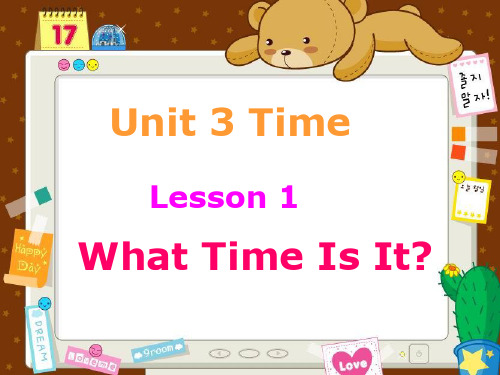
Unit 2 What Time Is It?
Part A
Let’s learn
English class
Unit 2 What Time Is It?
Part A
Let’s learn
Let’s do
Time for breakfast. Time for lunch. Time for dinner. Time for P.E. Time for music class. Time for English. Drink some milk. Have some chicken. Eat some rice. Jump and run. Sing and dance. Read and write.
Part A
Let’s learn
Unit 2 What Time Is It?
Part A
Let’s learn
It’s time for _______. lunch
Unit 2 What Time Is It?
Part A
ቤተ መጻሕፍቲ ባይዱ
Let’s learn
Unit 2 What Time Is It?
P.E. class
It’s ___ o’clock. It’s time for _____.
Unit 2 What Time Is It?
Part A
Let’s learn
P.E. class
Unit 2 What Time Is It?
Part A
Let’s learn
music class
Part A
Let’s learn
What time is it? It’s ___ 3 o’clock.
中职英语语文版基础模块上册Unit 4 Times 知识点汇总
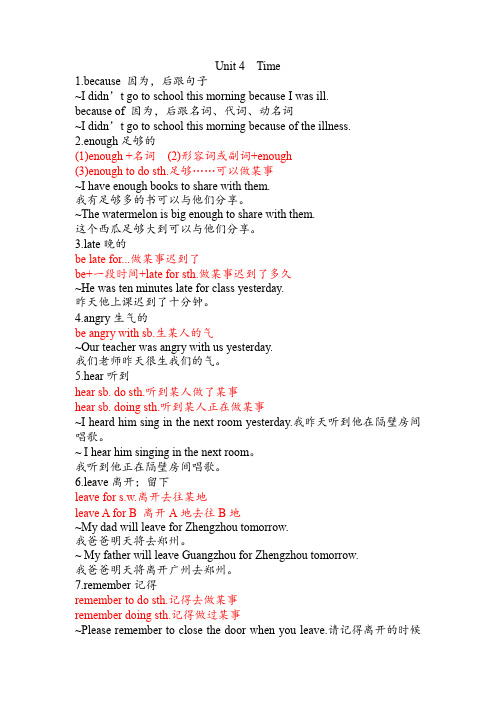
Unit 4 Time1.because 因为,后跟句子~I didn’t go to school this morning because I was ill.because of 因为,后跟名词、代词、动名词~I didn’t go to school this morning because of the illness.2.enough足够的(1)enough +名词(2)形容词或副词+enough(3)enough to do sth.足够……可以做某事~I have enough books to share with them.我有足够多的书可以与他们分享。
~The watermelon is big enough to share with them.这个西瓜足够大到可以与他们分享。
te晚的be late for...做某事迟到了be+一段时间+late for sth.做某事迟到了多久~He was ten minutes late for class yesterday.昨天他上课迟到了十分钟。
4.angry生气的be angry with sb.生某人的气~Our teacher was angry with us yesterday.我们老师昨天很生我们的气。
5.hear听到hear sb. do sth.听到某人做了某事hear sb. doing sth.听到某人正在做某事~I heard him sing in the next room yesterday.我昨天听到他在隔壁房间唱歌。
~ I hear him singing in the next room。
我听到他正在隔壁房间唱歌。
6.leave离开;留下leave for s.w.离开去往某地leave A for B 离开A地去往B地~My dad will leave for Zhengzhou tomorrow.我爸爸明天将去郑州。
中职英语基础模块第一册unit

中职英语基础模块第一册unit1. Introduction to UnitThe first unit of the vocational English basic module introduces students to the fundamentals of the English language. This unit serves as a foundation for the subsequent modules, laying the groundwork for essential language skills and knowledge. The unit aims to assist students in developing basic communication skills, understanding grammar structures, expanding vocabulary, and improving listening and reading comprehension abilities.2. Unit ObjectivesThe objectives of this unit are as follows:•To introduce students to basic English grammar structures•To expand students’ vocabulary related to everyday life and common topics•To enhance students’ listening and reading comprehension skills•To develop students’ skills i n basic communication and conversation3. Lesson 1: Greetings and IntroductionsIn the first lesson of Unit 1, students are introduced to common greetings and introductions in English. The lesson focuses on essential phrases and polite expressions used in different social contexts. Students will practice verbal and written exercises, engaging in role plays and dialogues to reinforce vocabulary andexpressions. The aim is to ensure that students are able to confidently greet and introduce themselves in various situations.4. Lesson 2: Numbers and DatesLesson 2 covers numbers and dates in English. Students will learn how to count and pronounce numbers, both cardinal and ordinal, from one to one hundred. Additionally, they will become familiar with different ways of expressing dates, including the day, month, and year format. The lesson includes interactive exercises to reinforce comprehension and practical applications of numbers and dates.5. Lesson 3: Family and RelationshipsIn Lesson 3, students learn vocabulary related to family and relationships in English. They will acquire the vocabulary necessary to describe family members, as well as phrases used to discuss relationships and personal connections. The lesson encourages students to engage in discussions about their own families and relationships, providing practical application of the vocabulary in real-life situations.6. Lesson 4: Daily RoutinesThis lesson focuses on daily routines. Students will learn vocabulary and expressions related to activities in their daily lives. They will practice discussing their daily routines and schedules, as well as forming sentences using appropriate verb tenses. The lesson incorporates various listening exercises and interactive activities to enhance understanding and usage of daily routine vocabulary and phrases.7. Lesson 5: Asking for and Giving DirectionsLesson 5 introduces students to vocabulary and phrases used when asking for and giving directions in English. Students will learn how to ask for and give various types of directions, such as asking for directions to a place or providing directions on a map. They will engage in role plays and practical exercises to reinforce their ability to understand and communicate directions effectively.8. Lesson 6: Time Expressions and AdverbsThe final lesson of this unit covers time expressions and adverbs. Students will learn to express specific times and durations using appropriate vocabulary and adverbial phrases. They will engage in listening exercises and writing tasks to reinforce their understanding and usage of time expressions and adverbs in context.9. ConclusionUnit 1 of the vocational English basic module provides students with a solid foundation in English language skills. By focusing on greetings, introductions, numbers, dates, family, daily routines, directions, and time expressions, students will develop essential communication skills necessary for various real-life situations. The unit aims to build students’ confidence in their ability to understand and use English in a vocational context.。
- 1、下载文档前请自行甄别文档内容的完整性,平台不提供额外的编辑、内容补充、找答案等附加服务。
- 2、"仅部分预览"的文档,不可在线预览部分如存在完整性等问题,可反馈申请退款(可完整预览的文档不适用该条件!)。
- 3、如文档侵犯您的权益,请联系客服反馈,我们会尽快为您处理(人工客服工作时间:9:00-18:30)。
My father looked very angry. 我爸爸看起来很生气。
My grandpa asked me to sit next to him.
爷爷叫我坐在他旁边
Here is …for you.
是当面给人某物的常用
“Here is a small gift for you,”
语
这是给你的小礼物
It’s time to say
goodbye.
Carefully-reading:
Paragraph1:
How did the boy feel when he heard his grandpa would come? why?
One day, my father said to me, 这个句子是现在进行时
一天
我的爸爸 告诉 我 态吗?yes/no
Grammar focus
1. 1) eight 2) twelve 3) fifteen 4) twenty eight 5) forty six 6) fifty three7) one hundred and six 8) one thousand three hundred and eighty nine 2. 1) first 2) second 3) fifth 4) sixth 5) eighth 6) eleventh 7) twelveth 8) eightith 9) forty third 10) two hundred and thirty ninth
Expression of the time .
时间的表达法: 1 . 整点 : 整点钟+o’clock 例如: ten o’clock 2 . 时间未过半 : 分钟+past+点钟(几点过几分) 例如:ten past ten 3 . 时间刚好一半 : half past + 点钟 例如 : half past ten
he gave his old watch to me said, 他把他的旧手表给了我 说
“It can tell you what the time is.” 它能告诉你钟点
Paragraph4: What will the boy learn about the watch?
Paragraph 4
兴高采烈的 太而不能 忙于做某事 迟了 乘
1. on time 2. already 3. too..to.. 4. leave for 5. by 6. online 7. am looking forward to 8. are late 9. in great joy 10. are busy with
“Your grandpa is coming tomorrow by plane to
see us.
九点半
还可以
你(的)爷爷 明天 乘飞机 来看我们。 怎样表
达?
Will you please get to the airport at nine thirty in
the morning to meet your grandpa on time?”
到哪儿去找爷爷呢?
paragraph3:
How did his grandpa come to the boy’s home form the airport?
Paragraph 3
It was after lunch when I got home. 过了午饭时间我才回到家, I found my grandpa was talking with my parents at home. 看见爷爷正在家里和父母说话 My grandpa was delighted to see me and said, 爷爷见到我很高兴 然后说 “Hi, my dear grandson! 你好呀!亲爱的孙子!
1
3 4
What’s the time?
It’s six o’clock.
It’s time to get up.
是……的时候了。
What’s the time?
It’s … ( o’clock).
It’s time to…
1
2
3
1
2
3
What’s the time?
It’s twelve o’clock. It’s time to have lunch. Let’s have lunch.
I know you are busy with your work and study. 我知道你学习和工作很忙,“忙于干某事儿”还可以如何表达?
So I took a taxi to come here from the airport.” 所以我乘出租车从机场来家了。”
Too…to…
I was too ashamed to say a word. 太…而不能... 我太惭愧了,一句话也说不出来。
the airport. So I played a computer game online with 于是 在网上与我的网友玩起了电脑游戏 Play with和…一起
玩
my e-pal. When we were playing in great joy, 当我们正玩儿得兴高采烈的时候
I suddenly remembered my grandpa. 我突然想起了爷爷。
似的还有哪些动词短语请尽量多的找出来。
“Ok. No problem.” I answered, “好的,没问题” 我 回答道, “ I will get to the airport before 9:30. Don’t worry.” 我会在九点半之前到达机场 别担心。
Paragraph 2
What does he do before he leaving for the airport?
a clock
time 时间
What’s the time?几点了? It’s twelve. It’s twelve o’clock .
整点
Ask and answer
Excuse me ,what’s the time?
It’s … (o’clock)
Excuse me ,what’s the time? 2 It’s … (o’clock)
Unit 4 Time
CC
1. Read out the numbers
Magic eyes
What can you see? I can see …
two staplers
nine apples
six pencils
也可以画一个圆,逐个标12个点。It’s a clock.我们用来看时 间。
people usually say time is money.
人们常说时间是金钱
But this watch tells me more than that. 但是这块表告诉了我更多 让步状语
No matter what to do, just do it on time.
无论做什么
一定要准时
Yes, I will remember. “Thank you grandpa.”
A. watch TV B. play a computer game online C. visit his best friend D. Talk with his parents
The next morning, I got up very early. 第二天早上, 我起得很早。
I had enough time to do something before leaving for 在去机场前我有足够的时间干什么 For 表示什么?
上午九点半你准时赶到机场去接爷爷好吗!
或would you please…? 请你做……好吗
Be glad to do sth高兴去做……
I was very glad to hear this because I was 我非常高兴听到这个消息,因为我正
looking forward to seeing my grandpa. 盼望见到爷爷。一般都是to do sth 而这儿却是to dift airport
plane
god computer game
in great joy
Emotions
delight
ashamed
angry
railway station
ticket train
breakfast lunch supper/dinner
Reading comprehension
是的 我记住了 ,
“ 谢谢您 爷爷。”
Language Study
on time look forward to doing leave for already online
准时 期待做某事 出发去某地
已经 在线
in great joy too...to be busy with be late by
My God! It was already 10 o'clock. 天哪! 已经十点了。
